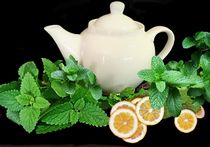Melissa officinalis
This article is a stub. |

Melissa officinalis L., commonly known as lemon balm, is a traditional dietary supplement which has a large number of possible uses.[1][2]
Theory
Evidence
Clinical trials of melissa officinalis (lemon balm) have not been carried out for patients with ME/CFS. Limited clinical trials exist showing effectiveness for many different symptoms, but these are almost all very small trials, on healthy adults, or provide weak evidence due to being unblinded studies, lack of a control group, or other methodology flaws.[1] Some evidence has been found for lemon balm showing:
- antioxidant effects
- reduced anxiety in the short-term and increased sense of calm
- reduced heart palpitations in the short-term
- reduced premenstrual syndrome symptoms
- reduced insomnia including in a pilot trial of people with mild to moderate anxiety[2]
- improved sleep quality
- improved concentration, and
- reduced cognitive dysfunction in mild to moderate Alzheimer's patients[1]
Świąder et al. (2019) found most trials used a dose of 300mg or 600mg.[1]
Clinicians
Risks and safety
Generally considered safe for adults. Side effects reduced self-rated alertness with the 600mg dose.[1]
Costs and availability
Lemon balm extracts, supplements and leafs are widely available and relatively inexpensive.[1]
See also
Learn more
- Outside articles: e.g. WebMD, Merck Manual, drugs.com, drugbank.ca, Memorial Sloan Kettering, or ScienceDirect
References
- ↑ 1.0 1.1 1.2 1.3 1.4 1.5 Startek, Katarzyna; Wijaya, Christofora Hanny; Świąder, Katarzyna (2019). "The therapeutic properties of Lemon balm (Melissa officinalis L.): Reviewing novel findings and medical indications". Journal of Applied Botany & Food Quality. 92: 327–335.
- ↑ 2.0 2.1 Cases, Julien; Ibarra, Alvin; Feuillère, Nicolas; Roller, Marc; Sukkar, Samir G. (2011). "Pilot trial of Melissa officinalis L. leaf extract in the treatment of volunteers suffering from mild-to-moderate anxiety disorders and sleep disturbances". Mediterranean Journal of Nutrition and Metabolism. 4 (3): 211–218. doi:10.1007/s12349-010-0045-4. ISSN 1973-798X. PMC 3230760. PMID 22207903.

